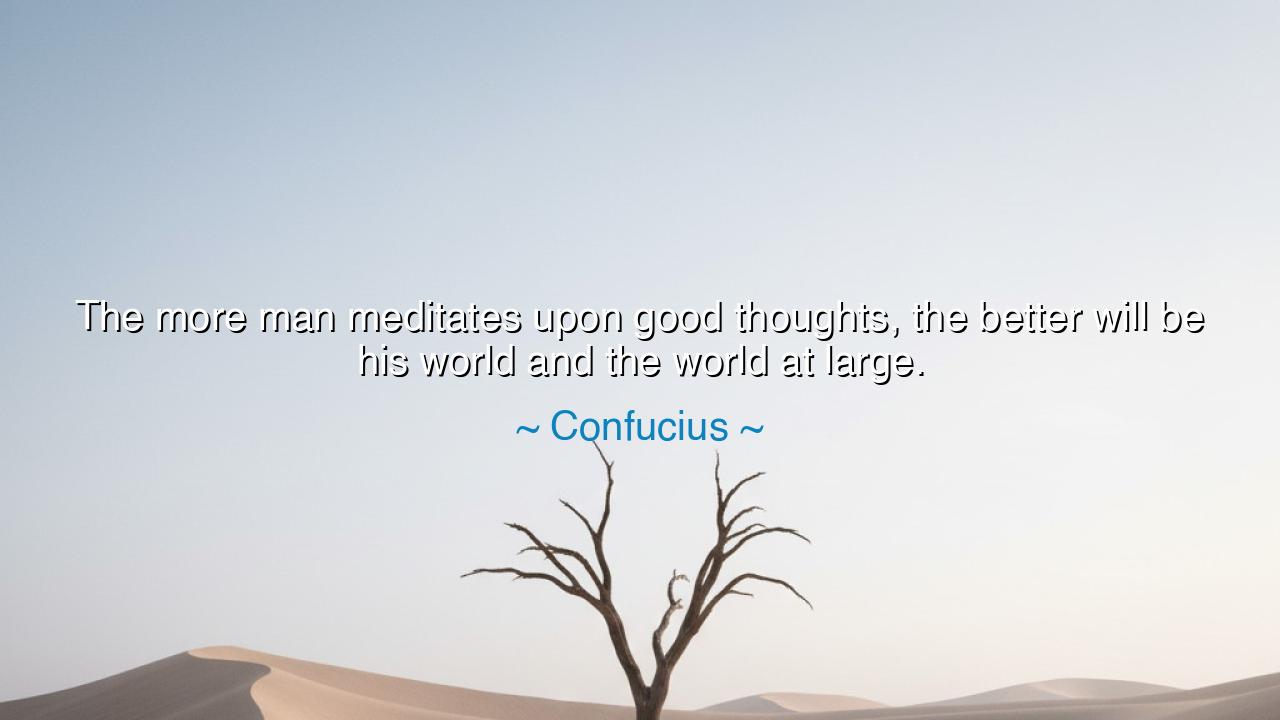
The more man meditates upon good thoughts, the better will be his
The more man meditates upon good thoughts, the better will be his world and the world at large.






In the timeless wisdom of Confucius, master of harmony and teacher of generations, we are given this radiant truth: “The more man meditates upon good thoughts, the better will be his world and the world at large.” These words, though spoken in the simplicity of plain speech, carry the gravity of mountains. For they proclaim that the destiny of nations begins not in palaces or marketplaces, but in the silent chambers of the mind. The thoughts a man tends become the seeds of his actions, and the actions of many shape the fate of the world itself.
The origin of this teaching lies in the Confucian vision of moral order. Confucius lived in a time of chaos, when kingdoms fought and virtue seemed buried beneath ambition. Yet rather than turning only to law or sword, he turned to the cultivation of character. He taught that a man who fills his mind with good thoughts—with kindness, justice, humility, and honor—will bring forth deeds of goodness. And when such men multiply, society itself is transformed. Thus the sage linked the smallest seed of thought to the grandest destiny of empires.
History testifies to this law. Consider the reign of Marcus Aurelius, the Roman emperor and Stoic philosopher. In his Meditations, he disciplined his mind daily with good thoughts, reminding himself of justice, temperance, and the duty of a ruler. Surrounded by wars and intrigue, he might have become cruel or corrupt, but instead he became known as one of Rome’s wisest leaders. His personal meditation upon virtue brought peace not only to his own spirit, but to the empire entrusted to him. In him we see Confucius’ teaching embodied: the world is bettered when its leaders guard their thoughts.
The ancients also told us the opposite: when thoughts grow dark, so too does the world. Recall Adolf Hitler, whose meditations were upon hatred, division, and vengeance. These thoughts, left unchecked, became words; those words became laws; and those laws led to destruction and death for millions. In his life, the principle is reversed: evil thoughts poisoned not only one man, but the world at large. Confucius warns us, therefore, that our private meditations carry public consequences.
The meaning of this quote is clear: the mind is a forge where the weapons of life are made. If it is filled with envy, fear, or cruelty, the world will be wounded. But if it is filled with compassion, hope, and justice, the world will be healed. To meditate upon good thoughts is not mere sentiment—it is the highest duty of the soul. Each noble thought is a drop of clear water, and when enough are gathered, they form the river that nourishes nations.
The lesson for us is simple, yet profound. Guard your mind as a gardener guards his field. Pull out the weeds of bitterness quickly, before they spread. Plant seeds of gratitude, kindness, and courage daily, for they will bear fruit in your actions. And remember that even a single person, meditating upon goodness, can influence countless others—just as one candle may light a thousand without diminishing its own flame.
Practical counsel is this: begin each day with a moment of reflection. Speak to your heart a thought of goodness—be it a vow to act justly, a reminder to forgive, or a word of encouragement. Return to it in moments of struggle. In time, these meditations will shape your character, your relationships, and your world. And when many people commit to this discipline, the collective power of their thoughts will lift humanity higher.
Thus, the words of Confucius ring across the centuries: “The more man meditates upon good thoughts, the better will be his world and the world at large.” They are both promise and command. Promise, because good thoughts will indeed bring forth good fruit; command, because it is our duty to cultivate them. Take this teaching, then, and live it daily. Let your thoughts be the builders of light, and through them, help shape a world worthy of the generations to come.






AAdministratorAdministrator
Welcome, honored guests. Please leave a comment, we will respond soon